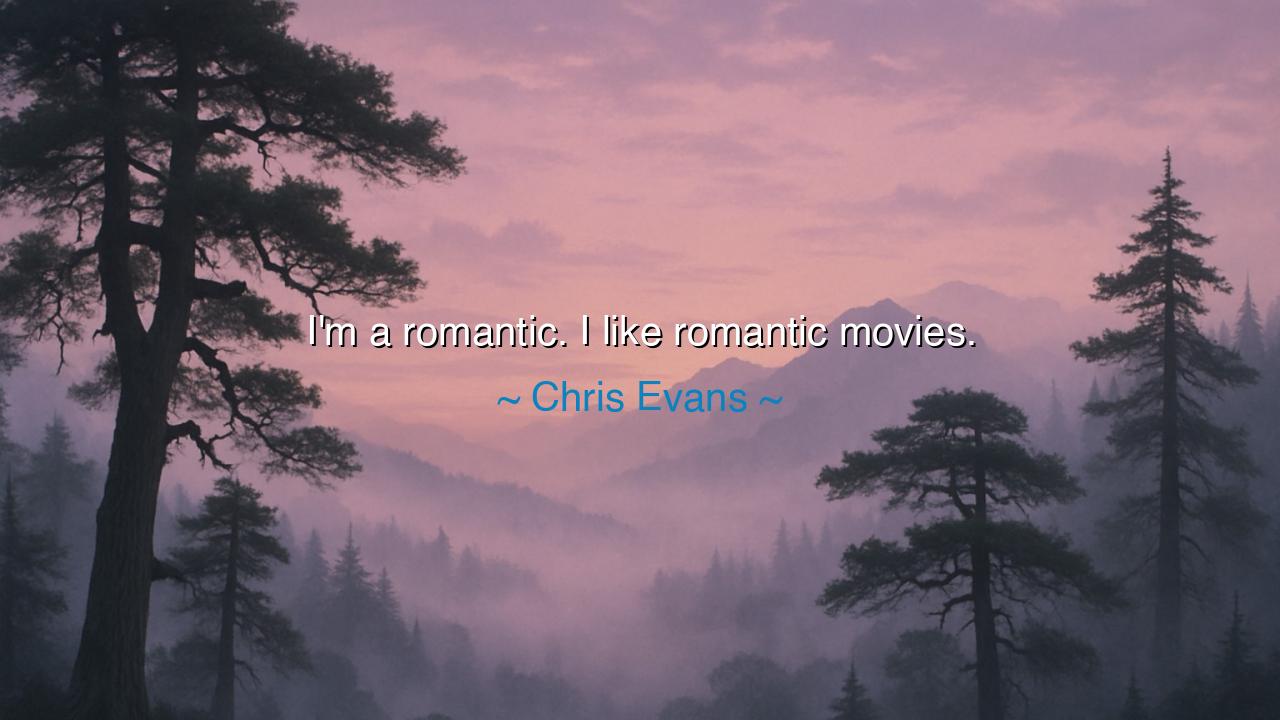
I'm a romantic. I like romantic movies.






"I'm a romantic. I like romantic movies." – Chris Evans. In these simple words, Evans reveals a profound truth about the human soul: that romance—in its many forms—has a timeless and universal appeal. The romantic spirit, as expressed in the movies and the stories that inspire us, speaks to the deepest longings of the heart. It is the yearning for connection, passion, and the eternal desire to find someone with whom we can share our lives and our most vulnerable emotions. Evans’ words serve as a reminder that romance, far from being an idealistic or fleeting emotion, is something deeply woven into the fabric of human existence, a force that elevates and inspires us to see the world through a lens of beauty, possibility, and love.
In the ancient world, romance was seen not only as a personal matter of the heart, but as a cosmic force that transcended the individual. The love between Orpheus and Eurydice, for instance, was not simply a story of two lovers—it was a tragic journey that crossed the boundaries of life and death itself. Orpheus’s love was so deep that he dared to challenge the gods, descending into the Underworld to retrieve his beloved. This kind of romantic devotion was not just about affection; it was about the willingness to sacrifice everything—life itself—in pursuit of love. The romantic ideals of sacrifice, devotion, and transcendence were at the heart of the ancient myths, and they still echo in the modern romantic movies that Evans cherishes.
Similarly, the Greek philosopher Plato viewed love as the pathway to higher truths and understanding. In his dialogue The Symposium, he presents love as a divine force that guides the soul toward beauty, wisdom, and truth. For Plato, romantic love was not simply about desire, but about seeking something greater than oneself. This idea of love as a transformative force, capable of leading the soul to spiritual enlightenment, resonates deeply with Evans’ affection for romantic movies. These films, at their core, are about the journey of the heart, the transformation that love brings to the individual, and the possibility of finding something that transcends the ordinary.
Take, for example, the story of Antony and Cleopatra, a tale of love and ambition that intertwines romance with political power. The tragic love between Cleopatra and Mark Antony became legendary not because of the romantic ideals they embodied, but because of the self-sacrifice and devotion they demonstrated in the face of inevitable destruction. Like many classic romantic figures, their love led to both glory and doom. This complexity of love—the way it elevates, transforms, and sometimes consumes—speaks to the timeless allure of romantic stories that Evans admires. The essence of romance in these stories is not just about perfect love, but about love’s capacity to change the course of lives.
In modern times, the magic of romantic films continues to stir the human soul. Think of Casablanca, where the character of Rick Blaine embodies a love that transcends personal happiness for the sake of a greater cause. His romance with Ilsa is not merely a passionate affair, but a testament to the sacrifices that love sometimes demands. In many ways, romantic movies like Casablanca or The Notebook speak to the very ideals that Plato and the ancients cherished—the ability of love to transcend the limitations of the self and to transform both individuals and the world around them. These films allow audiences to experience love in its most idealized and pure forms, reminding us of the beauty that exists when we open ourselves to vulnerability, sacrifice, and connection.
The lesson we can draw from Evans’ admission is the understanding that romanticism is not confined to one genre or time period, but is a universal thread that ties together the human experience. Romance, in its truest sense, is not just about infatuation or fleeting attraction; it is about connection, sacrifice, and the transformative power of love. Whether in the form of ancient myth or modern cinema, romance teaches us about the depth of human emotion and the possibilities of human connection.
In our own lives, we should not shy away from romantic love but embrace it with all the complexity and depth it brings. Whether in our relationships, our art, or our daily interactions, we should seek to live with the same devotion and authenticity that defines the best of romantic narratives. Like the characters in Evans’ beloved films, we must learn to sacrifice, to transcend our own desires for something greater, and to love with all the passion and dedication that the human heart is capable of. In doing so, we allow ourselves to experience the transformative power of romance—not as a fleeting moment, but as a guiding force that can shape our lives and the world around us.






AAdministratorAdministrator
Welcome, honored guests. Please leave a comment, we will respond soon